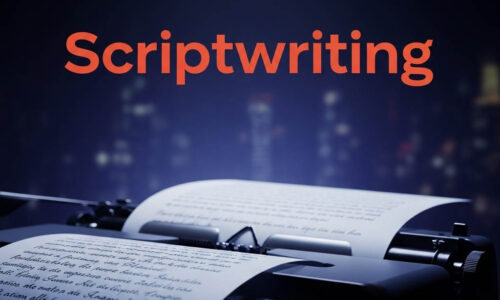Script Writing (Screenplay) | திரைக்கதை எழுதுதல்
Script Writing Course (AC017)
Unleash your narrative power and bring stories to life on screen with our Script Writing certificate course! This 3-month intensive program is designed for aspiring screenwriters, filmmakers, and storytellers eager to master the unique craft of writing for film, television, and digital platforms. Learn to craft compelling plots, unforgettable characters, and dynamic dialogue that captivates audiences from the first scene to the last.
Course Highlights:
- Duration: 3 Months
- Learning Modes: Online | Offline
- Medium: Tamil / English
- Who Can Join: Aspiring screenwriters, filmmakers, creative writers, storytellers, content creators, and anyone with a passion for visual storytelling.
- Educational Qualification: Basic reading and writing skills are essential. A willingness to explore dramatic concepts and receive constructive feedback is highly recommended.
- Flexible Schedule: Choose the learning schedule that best fits your life: Early Mornings, Evenings, Weekends, or Holidays.
What You’ll Learn (A Complete Practical Package):
Our curriculum offers a hands-on, workshop-style approach to screenwriting, focusing on developing dramatic intuition and practical writing skills for the screen:
- Introduction to Screenwriting:
- Understanding the unique demands of writing for the screen (film, TV, web series).
- Key differences between writing for page, stage, and screen.
- Industry standard script formatting and software basics.
- The Building Blocks of Story:
- Concept & Premise: Generating high-concept ideas and boiling down stories to a compelling premise.
- Logline & Synopsis: Crafting concise, intriguing summaries that hook readers.
- Theme: Identifying the central ideas and messages your story explores.
- Character Development:
- Creating believable, multi-dimensional characters with clear desires, flaws, and arcs.
- Understanding character motivation, backstory, and relationships.
- Heroes, villains, and supporting characters.
- Plot and Structure:
- Three-Act Structure: Mastering the classic paradigm (setup, confrontation, resolution).
- Inciting Incident & Plot Points: Identifying key moments that drive the narrative forward.
- Rising Action & Climax: Building dramatic tension and crafting a powerful turning point.
- Subplots: Integrating secondary storylines that enrich the main narrative.
- Pacing & Rhythm: Controlling the flow of the script through scene length and sequence.
- Scene Work & Visual Storytelling:
- Writing Effective Scenes: Ensuring each scene has a clear purpose and advances the plot/character.
- Action Lines: Describing visuals clearly and concisely to paint a picture for the reader/viewer.
- Show, Don’t Tell: Techniques for conveying information visually rather than through exposition.
- Setting the Scene: Creating vivid environments and atmospheres.
- Dialogue:
- Writing authentic, purposeful, and distinctive dialogue that reveals character and advances plot.
- Understanding subtext and what characters don’t say.
- Pacing and rhythm in conversational exchanges.
- Voice and cadence for different characters.
- From Idea to Outline:
- Brainstorming techniques (e.g., mind mapping, freewriting).
- Developing character outlines and beat sheets.
- Creating detailed scene-by-scene outlines.
- The Rewriting Process:
- Understanding the importance of multiple drafts.
- Techniques for self-editing and strengthening your script.
- Incorporating feedback effectively.
- Polishing and refining your script for submission.
- Introduction to Different Formats (Brief):
- Overview of feature film, short film, and episodic (TV/web series) writing.
- Understanding their structural differences.
- Protecting Your Work:
- Basic concepts of copyright and intellectual property for screenwriters.
Evaluation:
Your progress will be assessed through ongoing writing assignments, including character profiles, scene drafts, loglines, synopses, and a final project which will be a completed short film script or a substantial portion (e.g., 20-30 pages) of a feature film or pilot episode. Peer workshops and instructor feedback on your written work will be central to the evaluation process.
Learning Outcome:
Upon completion, you will possess a fundamental understanding of screenwriting principles and the unique craft of writing for the visual medium. You will be able to develop compelling story ideas, craft dynamic characters and dialogue, structure a dramatic narrative, and complete a short film script or a significant portion of a longer work, ready to be presented for further development or production.
Scholarships & Benefits
At Anali, we believe in supporting talent. Eligible candidates who meet our criteria will receive full scholarships and access to other beneficial offers from our service schemes.
Ready to Begin Your Journey as a Script Writer?
To start the admission process, please fill out the following form:
Instructor


